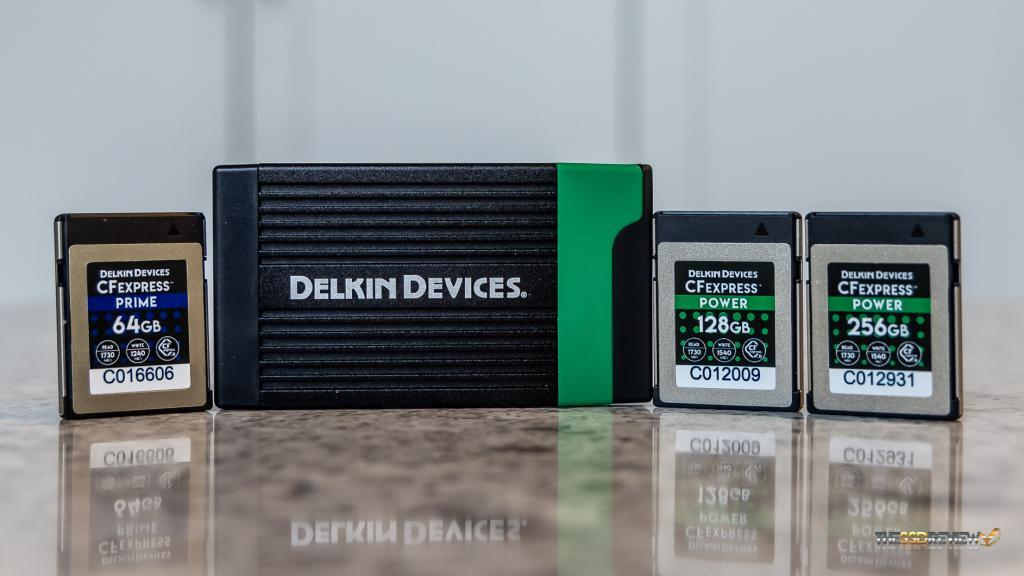If there is anything we have discovered with the release of the Canon EOS R5 camera in the past two months, its the need for fast CFexpress Type B cards at a low temperature. Our first two reviews of CFexpress Type B looked at the Lexar Professional and SanDisk Extreme Pro CFexpressB cards, both of which are “Canon R5 approved”. As fast as both are with data transfer speeds of 1700MB/s, their ability to heat things up became obvious with the both peaking above 80°C while the SanDisk Extreme Pro complicated things just a bit by thermal throttling and cutting speeds to cool its engine at 65°C.
Delkin Devices learned early on that the need for high performing CFexpressB cards would become evident, and also, the need for ‘typical’ storage card temperatures would play a key part in such cards success. Something not so obvious, at least until the R5 release, was that sustained transfer rates would become integral to the proper operation of this camera. Simply put, people were finding out the hard way that CFexpressB cards that could not maintain a sustained write speed of just above 300MB/s would cripple the camera when it came to high quality video. In camera video selections of 8K and 4K were simply not presenting themselves, or were greyed out.
Today, we will be testing three Delkin Devices CF ExpressB cards, the Power 128GB and 256GB capacities, along with the Prime 64GB card. Something that we were totally unaware of, at least until we had tested these cards and later spoke to Delkin Devices, was that the first two cards, the Prime 64GB and the Power 128GB, have recently been optimized for better performance, while the Power 256GB version is still the older version and has yet to be optimized. All three cards run at cool temperatures, but we discovered that the 64 and 128GB have sustained write data transfers well over 1GB/s, while the 256GB Power card has sustained write speeds of just over 300MB/s.
Delkin has also provided us with their USB 3.2 CFexpress Memory Card Reader. This reader is capable of 10Gbps read and write speeds up to 1050MB/s. Its packaging includes both USB-A and USB-C cables and this reader can be found at a number of local brick and mortar and e-tailer outlets as listed on the Delkin website. Typically, the delkin Devices USB 3.2 CFexpress Memory Card Reader seems to be selling for $54.99 US.
This Crystal DiskMark result above demonstrates the maximum speed possible on the Delkin USB 3.2 CFexpress Memory Card Reader when testing the Delkin Devices Power 128GB CFexpress Card. This can only be achieved when using the Type-C to Type-C cable and plugging it into a PC that is fully compatible with USB 3.2 at least at the 10Gbps level.
This result above was achieved using the Type-C to USB 3.1 cable of this reader and would be the typical result found from using this reader on any PC. For our testing today, we will be using Thunderbolt 3 which allows us to reach the maximum speeds of each card.
 The SSD Review The Worlds Dedicated SSD Education and Review Resource |
The SSD Review The Worlds Dedicated SSD Education and Review Resource | 


When was this test done? I bought a 256 GB card on December 1st, 2020 and I’m wondering if mine hes been optimized. Is there any way to check this?
The company has yet to contact us with respect to their update, which they assured that they would. Our tests can be easily reproduced with connection to a 10Gbps (1GB/s) Type-C connection from your reader to the computer if you have such a reader. Simply create a 15GB folder of video (movies) and copy it to the CFExpress Card. From there, create a new folder on the card and copy the media folder to the new folder. When you see the graphic of it copying, hit advanced. If it is the original card, the transfer will drop to below 300MB/s. If it is new, it will remain around 1GB/s (0r 1400MB/s if you are using a Thunderbolt 3 system as we do).